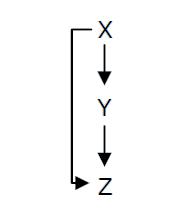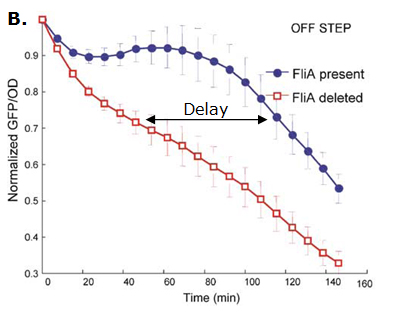Paris/FFL
From 2008.igem.org
(→The different types of FFL) |
(→Bibliography :) |
||
| Line 28: | Line 28: | ||
===Bibliography :=== | ===Bibliography :=== | ||
| - | + | * [http://www.nature.com/ng/journal/v31/n1/abs/ng881.html Shen-Orr ''et al''. (2002)] | |
| - | + | * [http://www.ncbi.nlm.nih.gov/pubmed/14607112?ordinalpos=1&itool=EntrezSystem2.PEntrez.Pubmed.Pubmed_ResultsPanel.Pubmed_DefaultReportPanel.Pubmed_RVDocSum Mangan ''et al''. (2003)] | |
| - | + | * [http://www.ncbi.nlm.nih.gov/pubmed/14530388?ordinalpos=2&itool=EntrezSystem2.PEntrez.Pubmed.Pubmed_ResultsPanel.Pubmed_DefaultReportPanel.Pubmed_RVDocSum Mangan ''et al''. (2003)] | |
| - | + | * [http://www.pubmedcentral.nih.gov/articlerender.fcgi?tool=pubmed&pubmedid=16729041 Kalir ''et al''. (2005)]'' | |
|} | |} | ||
Revision as of 02:05, 29 October 2008
Definition of a FFL
The different types of FFL
The type 1 coherent Feed Forward Loop with an OR gate introduces a delay after the extinction of the signal
In addition to the signs of the edges, to understand the dynamics of the FFL, we must also know how the inputs from the two regulators X and Y are integrated at the promoter of the gene Z. Uri ALON considers that there are two biologically reasonable logic functions : "AND" logic, in which both X and Y activities are need to be high in order to turn on Z expression and "OR" logic in which either X or Y is sufficient (Figure 2).
If the input function of the promoter of the gene Z is "OR", Z is expressed when X activity is high. There is no delay following the expression of X. But when X is not expressed anymore, its concentration decreases and reach the activation threshold of Y and Z. Y is not expressed anymore but as the concentration decreases, Z is still expressed. The OR-gate C1-FFL allow the gene Z to be expressed about one more hour after the gene X is OFF. (Figure 3)
Bibliography :
|
 "
"


